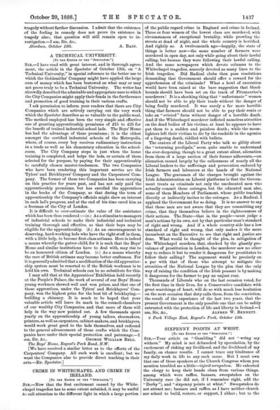CRTMR IN WHITECHAPEL AND CRIER IN IRELAND.
[To THE ED/TOR 07 THE "SPECTATOR."]
.SIR,—Now that the first excitement caused by the White- -chapel tragedies has to some extent subsided, it may be useful to call attention to the different light in which a large portion of the public regard crime in England and crime in Ireland. Three or four women of the lowest class are murdered, with circumstances of exceptional brutality, while prowling the streets at dead of night, and the whole country is horrified. And rightly so. A twelvemonth ago—happily, the state of things is better now—the same number of farmers were murdered in open day, not only while going about their lawful calling, but because they were following their lawful calling. And the same newspapers which devote columns to the Whitechapel tragedies, scarcely devoted as many lines to the Irish tragedies. Did Radical clubs then pass resolutions demanding that Government should offer a reward for the apprehension of the criminals ? What a howl of execration would have been raised at the bare suggestion that blood- hounds should have been set on the track of Fitzmaurioe's murderers ! It is a shocking thing that " unfortunate " women should not be able to ply their trade without the danger of being foully murdered. It was surely a far more horrible thing that farmers should not be able to pay their rents or take an " evicted " farm without danger of a horrible death. And if the Whitechapel murderer inflicted nameless atrocities on the dead bodies of his victims, at least he appears to have put them to a sudden and painless death ; while the moon- lighters left their victims to die by the roadside in the agonies of a lingering death, riddled with bullets.
The orators of the Liberal Party who talk so glibly about the "returning prodigals," seem quite unable to understand the ever-deepening, though to a great extent silent, alienation from them of a large section of their former adherents,—an alienation caused largely by the callousness of nearly all the Liberal leaders to the sufferings and persecution endured by Irish farmers and labourers at the hands of the National League. The gravamen of the charges brought against the Irish Administration on Liberal platforms is that the Govern- ment treats as criminals not only the uneducated men who actually commit these outrages, but the educated men also, some of them Members of Parliament, whose public teaching directly or indirectly incites to the outrages. As a Radical, I applaud the Government for so doing. It is no answer to say that these men are not aware that they are committing any crime, that they themselves believe in the righteousness of their actions. The State—that is, the people—must judge a man's actions by its own, not by that particular man's standard of right and wrong. And if a whole country-side has a low standard of right and wrong, that only makes it the more incumbent on the Executive to see that right and justice are done. What would be thought of the plea, in mitigation of the Whitechapel murders, that, shocked by the ghastly pre- valence of prostitution in London, the murderer saw no other way to reduce it but to render it dangerous for prostitutes to follow their calling D The argument would be precisely on a par with that of those who attempt to mitigate the atrocities of the National League by the plea that the only way of raising the condition of the Irish peasant is by making it dangerous for the farmer to pay an unjust rent.
Thousands of Liberals who on the last occasion voted, for the first time in their lives, for a Conservative candidate with great searchings of heart, will do so with much less hesitation on the next occasion that duty calls them, from the conviction, the result of the experience of the last two years, that the present Government is the only possible one that can be safely entrusted with the protection of life and liberty in Ireland.—I


































 Previous page
Previous page